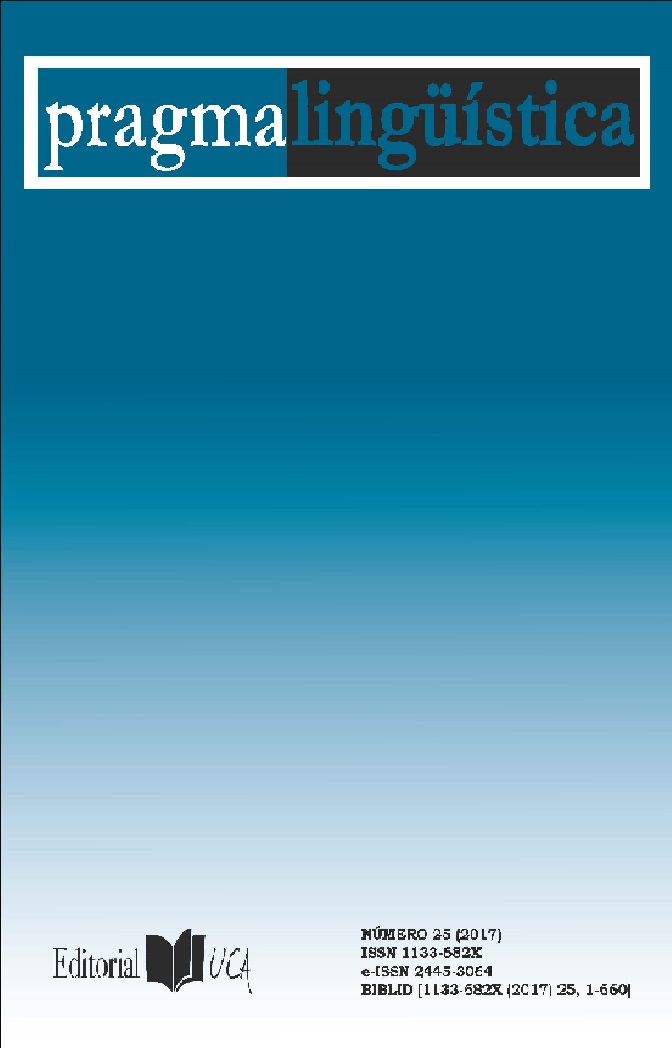Aún es posible una teoría esencialmente sintáctica y formal

DOI
https://doi.org/10.25267/Pragmalinguistica.2017.i25.17Información
Resumen
En 2015, Johnson-Laird, Khemlani y Goodwin plantearon cuatro razones por las que, en nuestros días, es complejo aceptar un enfoque básicamente sintáctico para explicar la actividad inferencial humana. No obstante, en este trabajo, intento mostrar que tales razones no revelan problemas reales en los marcos sintácticos y que la mayoría de las dificultades relacionadas con ellas ya han sido analizadas en la literatura de la ciencia cognitiva y consideradas como claramente superables desde una perspectiva principalmente formal. De este modo, argumento que todavía es posible defender que la sintaxis desempeña un rol importante en el pensamiento humano.
Palabras clave
Descargas
Cómo citar
Licencia
Derechos de autor 2018 Pragmalingüística

Esta obra está bajo una licencia internacional Creative Commons Atribución-NoComercial-CompartirIgual 4.0.
Citas
BETH, E. W. & PIAGET, J. (1966): Mathematical Epistemology and Psychology, Dordrecht, The Netherlands: Reidel.
BOMPASTOR BORGES DIAS, M. G. & ROAZZI, A. (2003): “A teoria da lógica mental: E os estudos empíricos em crianças e adultos”, Psicologia em Estudo, 8(1), pp. 45-55.
BRAINE, M. D. S. & O’BRIEN, D. P. (Eds.) (1998a): Mental Logic, Mahwah, NJ: Lawrence Erlbaum Associates, Inc., Publishers.
BRAINE, M. D. S. & O’BRIEN, D. P. (1998b): “How to investigate mental logic and the syntax of thought”, Braine, M. D. S. & O’Brien, D. P. (Eds.): Mental Logic, Mahwah, NJ: Lawrence Erlbaum Associates, Inc., Publishers, pp. 45-61.
BRAINE, M. D. S. & O’BRIEN, D. P. (1998c): “A theory of if: A lexical entry, reasoning program, and pragmatic principles”, Braine, M. D. S. & O’Brien, D. P. (Eds.): Mental Logic, Mahwah, NJ: Lawrence Erlbaum Associates, Inc., Publishers, pp. 199-244.
BRAINE, M. D. S. & O’BRIEN, D. P. (1998d): “The theory of mental-propositional logic: Description and illustration”, Braine, M. D. S. & O’Brien, D. P. (Eds.): Mental Logic, Mahwah, NJ: Lawrence Erlbaum Associates, Inc., Publishers, pp. 79-89.
DEAÑO, A. (1999): Introducción a la lógica formal, Madrid, Spain: Alianza Editorial.
GENTZEN, G. (1934): “Untersuchungen über das logische Schließen I”, Mathematische Zeitschrift, 39(2), pp. 176-210.
GENTZEN, G. (1935): “Untersuchungen über das logische Schließen II”, Mathematische Zeitschrift, 39(3), pp. 405-431.
GOUVEIA, E. L., ROAZZI, A., O’BRIEN, D. P., MOUTINHO, K., & BOMPASTOR BORGES DIAS, M. G. (2003): “Raciocínio dedutivo e lógica mental”, Estudos de Psicologia, 20(3), pp. 135-145.
HENLÉ, M. (1962): “On the relation between logic and thinking”, Psychological Review, 69, pp. 366-378.
HINTERECKER, T., KNAUFF, M., & JOHNSON-LAIRD, P. N. (2016): “Modality, probability, and mental models”, Journal of Experimental Psychology: Learning, Memory, and Cognition, 42(10), pp. 1606-1620.
JOHNSON-LAIRD, P. N. (2010): “Against logical form”, Psychologica Belgica, 5(3/4), pp. 193-221.
JOHNSON-LAIRD, P. N. (2012): “Inference with mental models”, Holyoak, K. J. & Morrison, R. G. (Eds.): The Oxford Handbook of Thinking and Reasoning, New York, NY: Oxford University Press, pp. 134-145.
JOHNSON-LAIRD, P. N. & BYRNE, R. M. J. (2002): “Conditionals: A theory of meaning, pragmatics, and inference”, Psychological Review, 109(4), pp. 646-678.
JOHNSON-LAIRD, P. N., KHEMLANI, S., & GOODWIN, G. P. (2015): “Logic, probability, and human reasoning”, Trends in Cognitive Sciences, 19(4), pp. 201-214.
KHEMLANI, S., ORENES, I., & JOHNSON-LAIRD, P. N. (2014): “The negation of conjunctions, conditionals, and disjunctions”, Acta Psychologica, 151, pp. 1-7.
LÓPEZ-ASTORGA, M. (2015): “The disjunction introduction rule: Syntactic and semantic considerations”, Pragmalingüística, 23, pp. 141-149.
LÓPEZ-ASTORGA, M. (2016): “Logic, pragmatics, and types of conditionals”, Frontiers of Philosophy in China, 11(2), pp. 279-297.
LUKOWSKI, P. (2013): “Is human reasoning really nonmonotonic?”, Logic and Logical Philosophy, 22, pp. 63-73.
MACNAMARA, J. (1986): A Border Dispute: The Place of Logic in Psychology, Cambridge, MA: Massachusetts Institute of Technology (MIT) Press.
OAKHILL, J. & GARNHAM, A. (Eds.) (1996): Mental Models in Cognitive Science. Essays in Honour of Phil Johnson-Laird, Hove, UK: Psychology Press.
O’BRIEN, D. P. (2009): “Human reasoning includes a mental logic”, Behavioral and Brain Sciences, 32, pp. 96-97.
O’BRIEN, D. P. (2014) “Conditionals and disjunctions in mental-logic theory: A response to Liu and Chou (2012) and to López-Astorga (2013)”, Universum, 29(2), pp. 221-235.
O’BRIEN, D. P. & LI, S. (2013): “Mental logic theory: A paradigmatic case of empirical research on the language of thought and inferential role semantics”, Journal of Foreign Languages, 36(6), pp. 27-41.
O’BRIEN, D. P. & MANFRINATI, A. (2010): “The mental logic theory of conditional proposition”, Oaksford, M. & Chater, N. (Eds.): Cognition and conditionals: Probability and Logic in Human Thinking, Oxford, UK: Oxford University Press, pp. 39-54.
ORENES, I. & JOHNSON-LAIRD, P. N. (2012): “Logic, models, and paradoxical inferences”, Mind & Language, 27(4), pp. 357-377.
RAGNI, M., SONNTAG, T., & JOHNSON-LAIRD, P. N. (2016): “Spatial conditionals and illusory inferences”, Journal of Cognitive Psychology, 28(3), pp. 348-365.
RIPS, L. J. (1994): The Psychology of Proof: Deductive Reasoning in Human Thinking, Cambridge, MA: Massachusetts Institute of Technology (MIT) Press.






